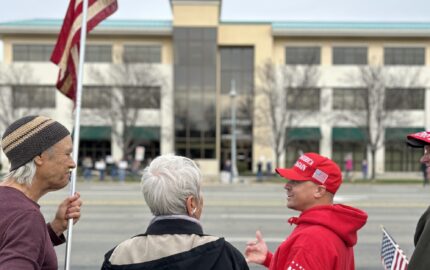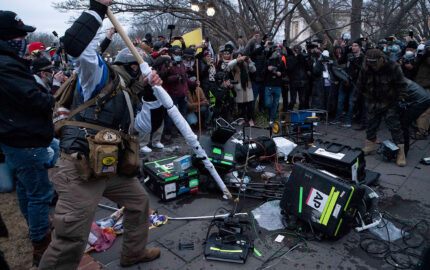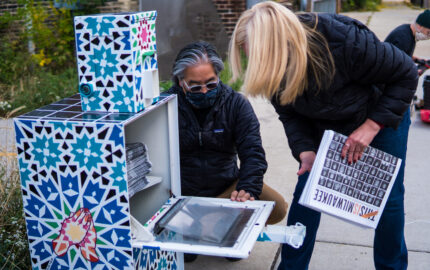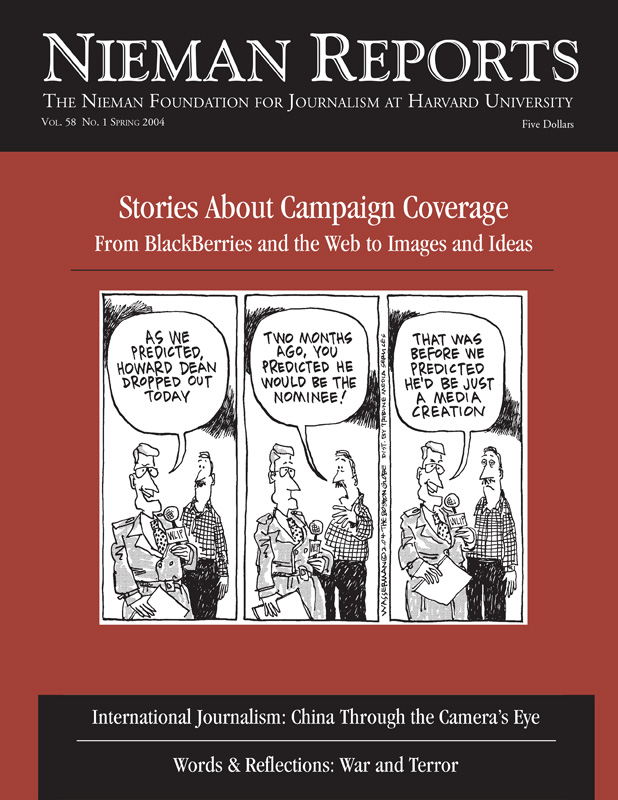
This has been a long—sometimes turbulent—ride that has raised in my mind some provocative questions about the way papers should cover a home-state candidate who runs for President. It would be hard to overstate the number of times I have cringed when national reporters I bump into ask me how “your guy” is doing. The last thing journalists should be doing is championing a candidate because he happens to hail from our circulation area. But the truth is that my midsized regional paper never would have invested so heavily in coverage of the presidential race if “our guy” hadn’t gotten into it.
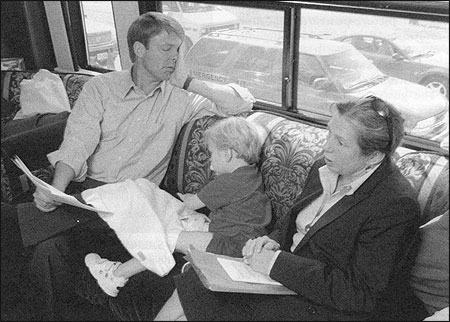
A weary John Edwards sits with his 3-year-old son, Jack, and former New Hampshire State Senator Caroline McCarley in the back of his campaign bus shortly after his family joined him in Nashua in August. Photo by Dan Habib/Concord Monitor.
Covering the Hometown Candidate
This raises a fundamental question that I’m not sure my paper ever fully resolved: Are we covering the presidential race, or are we covering how Edwards fares in the presidential race? Or both and, if so, how do we strike a balance between these two objectives?
Such questions became increasingly difficult to answer during the long summer as Edwards struggled to gain traction in the polls, while we remained at his side, watching every step along the way. Former Vermont Governor Howard Dean’s ascendancy was the major story line elsewhere. Were we skewing the reality of the race for our readers by writing so much about Edwards? On the other hand, didn’t we have an obligation to scrutinize his candidacy in a way unparalleled by any other paper in the country? (One Edwards aide actually referred to us as the campaign’s “inspector general” early on.)
The deck was completely reshuffled when Edwards came in second in the Iowa caucuses. Suddenly he and his candidacy were relevant again in terms of the overall race, and this prompted a whole host of editors at the paper to weigh in again with sometimes conflicting thoughts about which of the objectives ought to be our major focus—the presidential race or how Edwards was doing in it.
Early in the campaign, one point seemed indisputable: There really is no longer any such thing as a local paper when it comes to political reporting. This is because of the advent of the many Web-based publications like The Hotline and ABC News’s The Note that direct readers who are anywhere and everywhere to political pieces written in papers like ours. During these very early stages of the race—what The Note dubbed “the invisible primary”—it soon became clear to me that I had two audiences. There was our usual readership back home, reading the “paper” paper, and then there was the online community, some of which was directed to our newspaper stories by The Note and other similar intermediaries.
The two audiences had different interests in and tolerance levels for coverage of John Edwards. The online readers—a small but devoted audience paying close attention to the race—couldn’t get enough details about the campaign and its inner workings. Many of our print readers thought we were giving them way too much John Edwards coverage and didn’t hesitate to tell us so through the letters-to-the-editor column.
Partly because of these diverging interests, late in 2002 the newspaper decided to launch a Web site on which the news and information would be devoted exclusively to Edwards. Eye on Edwards debuted a few weeks before Edwards made the announcement of his candidacy in January 2003. The site gives readers links to all of our Edwards coverage from the newspaper, but also includes several online-only features. A running column called The Buzz features news nuggets such as new poll results, staffing hires, and the latest back-and-forth between candidates. Another section, called How He’s Playing, has links to stories about Edwards that have appeared in other publications.
As influential as we might fancy ourselves to be, the How He’s Playing section was a recognition that Iowa caucus-goers’ views of Edwards would probably be informed more by The Des Moines Register than The News & Observer. The site is, however, a useful outlet for the insider tidbits that we accumulate in the course of our reporting that might not have found a natural or immediate home in our paper.
The only downside to having this Web site is it has become another proverbial beast that needs to be fed, and I am usually the one responsible for doing so. It can be quite a challenge to find the extra energy to file updates on days when we shove off at eight in the morning and arrive at the hotel around midnight.
The Journalist and the Campaign
Some truth in advertising: A few days have passed since I started writing this article, and I’m finishing it on a laptop, not my Berry. Now I am sitting in a hotel in Blacksburg, Virginia, which seems to have endured an ice storm last night. (It’s another pre-8 a.m. shove off, and I haven’t ventured outside yet.) We’re just a couple of days past the South Carolina primary, which Edwards won rather decisively. That primary was one of seven nominating contests that Tuesday.
While on a chartered jet the next day, the candidate wandered to the back of the plane to visit with press and asked me how his hometown paper played his victory. I imagine you had nothing nice to say about me, Edwards said, joking, but only kind of, I think. “What was the headline?” he asked.
“Edwards loses another six states,” I said, prompting some laughter from both him and those around us.
Having covered Edwards so closely for so long has led to some rather strange relationships, both with the candidate and his longer-serving aides. Recently, I’ve been spending far more time with these people than my own family or friends. Living in our insular world, we now share campaign-related jokes that only we could possibly think are funny. There are other moments of shared joy, like discovering the hotel for the night has laundry facilities.
It’s also true that Edwards’s fate in this race could play a role in what I do with my career. It certainly has affected that mightily for the past two years. Yet as time goes by, I think I’m more cognizant than ever about the professional distance that needs to be maintained. There’s no better reminder than the occasional chill on the morning a story runs that the campaign thinks has hurt them. Only recently, I’ve started wondering what it will be like to return to a more normal life. It’s what I crave, yet I fear the transition will be difficult.
Of course, at this point, that could take place in a week or in January 2013, at the end of Edwards’s second administration.
John Wagner is a Washington-based reporter for The (Raleigh) News & Observer. He is now covering Senator John Edwards’s presidential campaign full-time.
